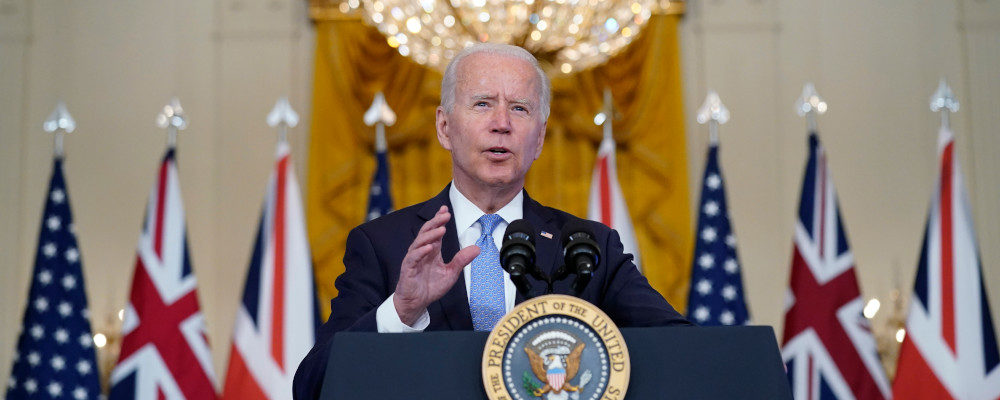A consensus has quickly formed that the post-Cold War peace dividend is definitively at an end. Russia’s invasion of Ukraine has reinvigorated NATO and triggered many Western countries to bolster their defences. Even the Trudeau government has promised a new defence review.1Liberal budget is vague on greater defence spending amid Ukraine war, pending ‘review’ However, the war in Europe has not yet forced Canada to confront some hard choices it will need to make to remain a safe and secure society in the decades ahead.
Canadian MPs seem to accept that a more unstable world with new competing powers might now necessitate a more “engaged” posture—to use the favourite liberal terminology—but in practice, engagement requires some choices. Which clubs should Canada be part of? NATO and G7 aid commitments are not enough. Even if NATO expands to include Finland and Sweden in the next few years, these old alliances will likely be supplemented with new partnerships, particularly in the Asian and Pacific arenas.
Before last year, these new alliances were not much more than theoretical, but now other defence opportunities present themselves and it is time that Canada’s politicians paid attention. The defence pact between Australia, the U.K. and the U.S.—AUKUS—first unveiled in 2021 is the most important so far.2What is the Aukus alliance and what are its implications?
When suddenly announced in a three-way news conference with the heads of government in the U.K., U.S., and Australia in September last year, like most countries Canada was caught by surprise.3Canada caught off guard by new security pact between U.S., Australia and Britain For Australia to exit the submarine deal they signed with France was a highly sensitive decision and for this reason alone, Canada (or other allies) could not have been given advanced notice of any kind.
What makes it special is that AUKUS is a coalition of the willing between three countries that already collaborate extensively on national security intelligence. Canada meets all these conditions too, as a founding Five Eyes member, but Ottawa has yet to show any public interest in participating in AUKUS. So why should AUKUS be of interest to Canada?
Initially, Trudeau suggested that AUKUS is not relevant to Canada because the country does not have, and does not want or need, a nuclear submarine capability. But this is a denial of what AUKUS already claims to be—an emerging defence technology and procurement partnership that extends into hypersonic engine technology and cyber. Publicly, the scope of the agreement has already widened since September, suggesting that there is a series of initiatives that will progressively deepen the collaboration between AUKUS members in the years ahead.4Trilateral AUKUS defence pact expands to hypersonic missiles and electronic warfare
The AUKUS pact should really be seen as the forerunner of something more substantial—like the early Coal and Steel Community was for the European Community (EC) and the EU that came later. This is often how critical multi-lateral organizations start out. Important geopolitical alliances very rarely emerge fully formed. Speaking to former British defence advisors, they see some clear synergies between the areas of technology that all three nations already need to perfect and industrialize to outcompete the Chinese. These include space and satellites, 6G and 7G communications, and advanced computing and AI, which will have major defence policy implications. Canada should have an interest in all of these domains.
And if the potential then expands beyond pure defence programmes, then it becomes even more important that Canada is a party to it, and Canada as a member would also have a lot more to offer. If the original defence partnership of AUKUS bears fruit this decade, then it will be natural and less controversial for Canberra, Washington and London to extend it into the mobility and trade domain, with clear opportunities for more university R&D collaborations, government exchange programmes, and probably free movement for scientists and engineers working on AUKUS programmes.
Over time this could result in wider economic benefits too, for example in the type of advanced aeronautical engineering that could deliver ultra-high-speed passenger airplanes. Reaction Engines is an impressive example of a British start-up with a U.S. test site where the pursuit of hypersonic engines could end up revolutionizing civilian air travel, literally bringing Australia much closer to both key partners and integrating their economies more closely. A world where business travellers can get from London to New York in 45 minutes and to Sydney in 2.5 hours is utterly transformed and makes the geographic barriers to closer national alliances in multiple time zones much less relevant.
It is early days but AUKUS was always more than just a submarine procurement deal. It was a recognition that the world has become more dangerous and unstable and that like-minded countries should commit to spending more on defence and do so in a coordinated way, where they can level up their technologies to match China and exploit their other military advantages.
And the backdrop to this new agreement presents a challenge to Canada on defence spending too. The governments of all three AUKUS countries—under whatever political party—are likely to increase defence expenditure consistently over the next decade or more. That is a direction of travel that was set before Ukraine, but it will now be cemented for the foreseeable future.
However, this consensus is slow to emerge in Canada. In fact, Canadians have never prioritized defence spending at any time since the end of the last world war.5Canada may increase its defence spending – but that doesn’t mean it’s serious about restoring our military As Kim Richard Nossal has argued, the peace dividend at the end of the Cold War led to major defence cuts that hollowed out the country’s state capacity to invest in and procure the right military equipment.6Charlie Foxtrot: an essay on defence procurement in Canada For years Canada became just another unequal member of NATO—dependent on the nuclear umbrella provided by the U.S. and, until recently, matching Germany in its complacent lack of interest in paying for its own defence.
Since the Russian assault on Ukraine, it now looks like the Trump doctrine of NATO allies paying their fair share of 2 percent of GDP on defence is likely to become reality among most European members. But even based on the latest budget, the boost needed for Canadians to start spending more than 1.5 percent of GDP on defence will take until 2025 to be delivered, so there is much further to go. And Western countries left underwater by excessive spending and Covid debt will need to follow through once the immediate Ukraine emergency has ended.
Even despite this fiscal hurdle, a new alliance like “CAUKUS” could come to define the West’s security for the coming China challenge. But with chronic underinvestment in defence and security, would Canada even be a valuable partner in such a pact? The answer may be in the broader benefits that Canadian membership might offer AUKUS, beyond military spending itself.
The incentive for AUKUS nations would be to use collaboration on defence technology and exchange to bring Canada to the table and then encourage Ottawa to step up where they can add the most strategic value. Two areas where Canada can and should offer advantages for a future CAUKUS pact are Artic defence and energy and mineral security.
For years many defence experts have argued7On the Arctic Watch: Why we need to protect Canada’s sovereignty and security in the Far North: Jeff Collins for Inside Policy that the threat to Canada’s sovereignty in the Arctic should be taken much more seriously. Increased defence spending and permanent deployments in the Arctic region would signal that Canada is prepared to take a lead in guaranteeing the security of a critical region that will become easier to exploit militarily (and more valuable economically) as climate change transforms the sea lanes and the trade and mining potential.
With rising global temperatures comes a shift in the strategic value of the Arctic and the manoeuvre space in the maritime domain. This is one area where climate change offers benefits to Canada that ought to be recognized and exploited, but it also exposes NATO’s largest territorial member to more geostrategic risk and confers more of an obligation to lead in the defence of this region.
But Canada’s contribution to AUKUS could be more than just defensive. Shared defence procurement will need expertise from all countries and robust and reliable defence export agreements. Critical industries will need resilient energy supplies. Just for its own sake, Canada should be racing ahead and exploiting its rare metal resources and also leveraging energy exports, especially Liquified Natural Gas, to help Europe and countries like India that will otherwise continue to depend on Russian imports.
Like Australia, Canada should see itself as a key supplier of the critical minerals and raw ingredients that the high-value tech sectors of the U.S. and Europe increasingly need to support their economic growth and diminish their supply chain dependency on China. Not to mention the fissile material and rare earth metals that are used in advanced defence technologies that AUKUS wants to develop.
Finally, Canada has much more to offer a partnership like AUKUS than a nation like New Zealand, or even arguably Japan. It is larger than Australia and with a landmass facing three major oceans and with more natural resources to exploit. The swift addition of Canada to create a CAUKUS pact that goes beyond defence into trade, R&D, and energy collaboration would make AUKUS a more coherent and meaningful partnership that has clear practical utility to all members.
NATO will endure and Canada will continue to play a vital role there but it is never going to evolve politically into a deeper partnership because the alliance’s membership is too large and its member interests are too diverse. By contrast, AUKUS has real potential. It is the first example of a new trilateral partnership that could evolve into a serious trade, technology, and defence alliance that will help protect our economies and societies from the strategic threats to our way of life in this century posed by China and other autocratic states. Canadian politicians should want to participate in it, and it should come with some willingness to pay for the collective benefits.
If Ottawa wants to get onboard with AUKUS, then key domestic decisions around increasing defence spending, or barring Chinese involvement in domestic telecoms (the “Huawei decision”) would need to be resolved soon so that Canada aligns its policy with the U.K., Australia and the U.S. Currently, this does not seem to be on the Liberal government’s agenda and the best explanation for this is because Canadian high politics under Trudeau has become far too narrow spectrum—devoting most of the ministerial bandwidth in Ottawa to carbon, human rights, domestic reconciliation, and welfare entitlements like childcare and dental coverage, to the exclusion of topics that only the federal government can lead on, like trade, defence, and how to combat hostile states and rising foreign competition.
Ultimately Canadian voters would need to support the CAUKUS concept. It must be positioned as a venture that will support Canadian jobs, create new trade opportunities, and deliver a new security architecture that helps revive Canada’s depleted military. That is the prize, but first, they need to be sold the proposition. This would require some ambition and vision from Canada’s political class and a recognition of how much Canada needs to do to stay relevant in a more insecure world. And for now, that feels like too much to hope for.




